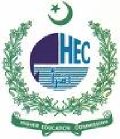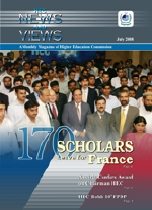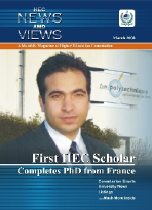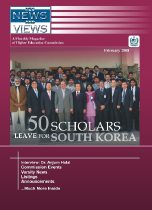Dr. Athar Osama
 Over the last several years of the current government, the Higher Education Commission (HEC) has funded thousands of scholarships and fellowships for Pakistanis to do PhD and Post-Doctoral work both at home and abroad. One of the most important of these programs has been the Foreign PhD Fellowships Scheme that funds as many as 1000 PhD fellowships per year for Pakistani students to go to countries around the world – mostly in Eastern Europe and South East Asia – to do their doctoral studies and return back after a specified duration of time to serve in Pakistani institutions.
Over the last several years of the current government, the Higher Education Commission (HEC) has funded thousands of scholarships and fellowships for Pakistanis to do PhD and Post-Doctoral work both at home and abroad. One of the most important of these programs has been the Foreign PhD Fellowships Scheme that funds as many as 1000 PhD fellowships per year for Pakistani students to go to countries around the world – mostly in Eastern Europe and South East Asia – to do their doctoral studies and return back after a specified duration of time to serve in Pakistani institutions.
Now that the first cohorts of these HEC scholars are completing their studies, the question arises: Will they return to Pakistan? And if they do, will they stay?
The terms of the program, I am told, are designed in a manner so as to dissuade these students from staying abroad after finishing their studies. This is done through a number mechanisms, including, provisions that discourage foreign employers and universities from hiring these students, and sending them to countries that are deemed not-so-hospitable to immigrant workers because of language barriers or immigration restrictions. Other initiatives to attract and absorb this talent back home include the ambitious plan of making several “world class” universities with international collaboration in Pakistan. Much has been said, and will continue to be said, about the latter and its fate continues to be in question.
While one would hope that these mechanisms put in place by HEC have been carefully thought out not only from the perspective of the country but also from that of the scholars, the other side of this coin, namely, the reception and environment these students receive when they actually return back to Pakistan has received much less attention but is equally, if not more, important for it is not enough to make these people return to Pakistan but rather policies must be in place to properly utilize and retain them.
At Pakistan Research Support Network (or Research-Network) we carried out a brief survey of the perception of Pakistani researchers and research students about the country’s research and academic environment and their motivations to work abroad or in their home country. The survey was anonymous thus allowing respondents to freely express their views and thoughts on the subject.
The survey findings represent an ample amount of both good and not-so-good news for Pakistan and its research environment. It also highlights interesting tendencies and motivations among its respondents some which may have been anticipated, but never formally documented before. These may be divided into four categories.
First, with regards to the quality of research environment in Pakistan, scholars identified a number of deficiencies including lack of quality leadership at the university, institution, and department level (92% of respondents), shortage of quality manpower (73%), and lack of quality and professional managed institutions (69%). Clearly, while an overwhelming proportion of scholars thought that Pakistan’s research and academic environment was inadequate to utilize their talents, more than 85% actually believed that Pakistan’s research and academic environment was lacking but improving over time.
Second, we asked the scholars about the intentions and motivations for returning home and/or working abroad. We believe that these individuals are very motivated and are quite realistic in terms of their expectations of what the country will have to offer to them but perhaps a little unrealistic in their perception of whether they will be able to overcome the challenges likely to be put in their way. For example, while just over 15% thought that when they return to Pakistan they will have all the necessary ingredients to allow them to carry out their research, as many as 79% said that “while they will face several challenges, but they will overcome these”. About 32% expressed serious doubts about the research and academic environment in Pakistan and noted that their decision to return will depend on whether they are able to address those concerns.
Of those surveyed, as many as 26% said that they will return back to the country because they have a “bond” with HEC or their employer to fulfill, another 34% said that while they do not have a bond with HEC or their employer, they will return back to Pakistan, nonetheless, and around 8% said that while they have a bond with HEC or their employer they are “rethinking” if they need to get out of it.
These data provide some very interesting–and heartening–results as well as opportunities for HEC or other competent agencies to devise policies to help these individuals make an informed decision. There is a vast majority of people who are willing to take on the challenge of returning back to Pakistan with a PhD in the hope that they will overcome the challenges involved. This population–young, idealistic, enterprising but also dedicated and passionate about their work–is especially vulnerable and HEC will do itself and the nation some good service to take extra care in transitioning them back into mainstream research in Pakistan.
Third, we asked the scholars about factors that demotivates them and that ultimately hamper their research productivity as a result. Several factors stood out. Freedom to work and micro-management by higher-ups (88% of scholars), access to equipment, knowledge, and data bases (75%), enough time to do research (72%), financial security (56%), and professional incentives (55%) are important consideration. The least important of all those asked–but still quite important–was financial incentives (chosen by 47%) of the scholars.
Again, evident from these responses is level of commitment and the degree of professional maturity of these scholars as are potential lessons for HEC bosses to understand and fully absorb for these are not the kind of qualities often associated with the tribal culture of Pakistani institutions where loyalty and conformance rather than freedom of expression, curiosity, and willingness to challenge intellectual authority are synomous with career progression.
Finally, there is ample room for both good news and source of concern for HEC. First of all, as many as 85% of the respondents thought that while Pakistani research and academic environment provided some challenges, it is also improving thus providing a reason for HEC to celebrate. A fairly substantial proportion of individuals are planning to return to the country which is yet another reason for HEC to be happy about. How HEC plays its cards in the coming years is likely to decide what percentage of these “likely return-ers” does it manage to convert into actual “return-ers”.
One issue of potential concern, however, is the notion or perception that HEC pays more attention to quantity rather than quality (shared by 70% of the scholars) is something that needs to be looked into and corrected for it is an often cited criticism of HEC’s policies. On the whole as well, I believe there is need for HEC to better explain its policies and programs for returning these individuals back, put it out in black and white so that people can make their future plans based on an explicit set of transparent policies rather than statements and comments that frequently appear in media.
There is also a need for a more transparent and open policy-making process at HEC that would help alleviate some of the questions and concerns these individuals may have about their future in Pakistan. Finally, HEC must develop a program to systematically evaluate the effect of its policies as well as communication strategy through independent evaluators to be able to better understand its own target market–researchers and academics inside and outside Pakistan–but also fine tune its own policies and programs. I think that if HEC could take a leaf from the findings of this survey and devise policies to help bridge some of the gaps identified above, it will finding a receptive and willing audience of young, educated, ambitious, and patriotic Pakistani researchers and scientists willing to return back and serve their homeland.
Dr. Athar Osama holds a PhD in Science and Innovation Policy and is the Founder of Pakistan Research Support Network and Muslim-Science.com






















































@Ahmad R. Shahid
I’m afraid I disagree with you completely. Oh, how I WISH we had the “problem” of having too many people with doctorates instead of the problems that we have now.
I agree that Pakistan needs loads of skilled workers with bachelors and masters degrees so that we can move into the sectors India and other countries are already beginning to dominate. However, we must recognize that long-term, sustainable progress can only come through research. Ask yourself this question, why is the American economy as large as it is, even though it produces (relatively) only a trickle in the way of tangible goods? Take away Stanford, and you no longer have Yahoo, Google, and a sizable portion of Silicon Valley….the examples are endless.
Just in the past few years, there has been a very significant rise in the number of research papers coming out of India and China which is just one indicator of the fact that they are already investing in these areas.
Good Artcile and nice comments.
I would like to say a few words. Pakistan today is at a brink of dearth of professioanls and hardworking people due to the lack of instituions where they could comfortably fit. Inorder to start the reaction and get required products, Govt. of Pak and HEC scholars and others would have to interact and contribute their role. The establishment of new universities of international standard would be worth making scholars return to Pak and utilize their skills in novel research areas of their interest. So the policies of HEC matters a gr8 deal. The research insituions already present at Pak like NESCOM and likewise may play a major role due to their stronghold in financial and labs aspects to absorb fresh scholars and let them do what they find themselves best in and providing them access to scientific databases which is falls in top 3 pre-requisits.
The govt. would have to be stable to get this reaction sustained
otherwise invested funds would have no use. 1 Man could improve the destiny of the Nation and destroy as well (latest examples). Mansur said q8 nice word of Jihad. Its really like a Jihad doing any thing for gud reasons in Pak. and Jihad needs
consistent toil. So lets be selfless and honest for the cause. May Allah Bless us all. Amen
I would ask the same question. Why is it important to people do PhDs just for the sake of it and how it would help Pakistan? I think all these PhDs won’t be able to help Pakistan in anyway except taking away any incentives for the PhDs since there would be too many of them vying for some very small pie. The share of each PhD would be miniscule.
I think only nations who have reached a certain level of technological development need the PhDs and the research. We are still doing the catch up and for the catch up you don’t need to create new technology but try to master what is already there. That is easier to achieve than trying to build a research base, in terms of training of the professional manpower and money, which we both lack in.
PhDs are essentially trained in research. In order to professionally train the technical manpower we don’t need them. That job can easily be done by Bachelors and Masters, what we have been doing over the last many years. Probably the reason that we were not producing too many engineers was that we didn’t need them. We produced what we actually needed, the rest were trained on job. If there was really a shortage then the payscales of the engineers should have been really high, which was essentially not the case. So there was no apparent shortage of engineers.
But with the opening of so many universities, there would just be too many engineers in the market, who would do nothing but depress the salaries of the people in the market, taking away the incentive to be an engineer and leading to mass exodus of so many of them in search of greener pastures. If that is the aim of the government to send as many of them abroad as possible then HEC would surely achieve its aim. But in my view that surely is not the aim.
As an academic, I see returning to Pakistan and to engaging in serious academic research with like minded colleagues and talented students as an almost-dream-like opportunity but one that would entail significant professional costs. An uncle of mine who was once chairman of the electrical engineering department at Quaid-i-Azam University in Islamabad decided to return to Britain where his sons were enrolled in University, but he could never again find academic work because his years in Pakistan were black holes in the Western-academic job market.
The greatest educational problems in Pakistan exist in primary and secondary school. Students emerge from secondary school without the training that would allow them to survive in almost any university of internationally recognized quality.
Shouldn’t primary-secondary school education be emphasized over and above an expansion in post-graduate research activity?
The aim of these scholarships is noble; national development. The approach of these ‘scholars’ should be noble too; return to Pakistan and serve the country which funded their studies. They become aware of the western standards and then compare conditions back home and have second thoughts (if they did not have them already before coming for the doctorates). I see them as potential trail blazers who can not only bring to the country hard earned knowledge but more importantly the awareness that waht all is wrong here and then strive (Jihad, if I may say so) to set the things right while disseminating the knowledge that they gained.
PLEASE COME BACK; THIS COUNTRY AND ITS POOR COUNTRYMEN HAVE SPENT A LOT ON YOU AND YOU CAN CONTRIBUTE YOUR BIT IS BETTERING THE LOT OF POPULACE HERE.